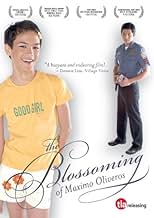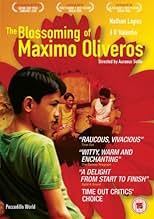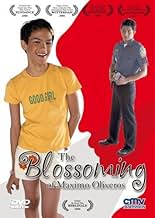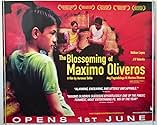L'éveil de Maximo Oliveros
Titre original : Ang pagdadalaga ni Maximo Oliveros
- 2005
- Tous publics
- 1h 40min
NOTE IMDb
7,0/10
1,7 k
MA NOTE
Ajouter une intrigue dans votre langueA young boy falls in love with a handsome policeman who is investigating his family's criminal activities.A young boy falls in love with a handsome policeman who is investigating his family's criminal activities.A young boy falls in love with a handsome policeman who is investigating his family's criminal activities.
- Réalisation
- Scénario
- Casting principal
- Récompenses
- 24 victoires et 28 nominations au total
JR Valentin
- Victor Perez
- (as J.R. Valentin)
Jett Desalesa
- Leslie - Maxi's friend
- (as Sir Jett Desalesa)
Avis à la une
Is Maxi Gay? Well, he dresses like a girl and has a crush on a hunky policeman. But as the story develops one has to wonder whether Maxi is actually a gay preteen or just a troubled boy in a difficult situation. Does it matter? Not really.
After the death of his mother due to an unknown illness Maxi has taken over her role in taking care of his two brothers and father, all petty thieves. The arrangement seems to work fine. Maxi delights in cooking and cleaning for his family and enjoys a playing Miss Phillipines with his "girl" friends. But everything changes when a hunky young cop arrives. Maxi develops a crush and is forced to choose between his family and his feelings for the cop. Needless to say thinks get complicated and even turn ugly and violent.
This film impressed me when I saw it at a screening at the International Filmfestival Rotterdam. There are faults but mainly the film is strong and well executed. The acting is impressive, although Maxi starts out a bit of a stereotypical screaming queen.
If anything the film is a bit too long, there are several moments that could be deleted without much effect. Also the quality of the picture and sound is understandably not up to western standards, although this does not distract from the story and I have seen much worse.
One of the questions I am left with is whether this accurately portrays Philipine's attitude towards (effeminate) homosexuality. If so that is to be commended, however it is hard to imagine such utter and complete tolerance, not only of Maxi but also of his friends. In a film with such a premise one sort of expects some exploration of the subject. However the lack thereof does not affect the story, it may even make it stronger.
I hope you will go see this movie, if you get the chance!
After the death of his mother due to an unknown illness Maxi has taken over her role in taking care of his two brothers and father, all petty thieves. The arrangement seems to work fine. Maxi delights in cooking and cleaning for his family and enjoys a playing Miss Phillipines with his "girl" friends. But everything changes when a hunky young cop arrives. Maxi develops a crush and is forced to choose between his family and his feelings for the cop. Needless to say thinks get complicated and even turn ugly and violent.
This film impressed me when I saw it at a screening at the International Filmfestival Rotterdam. There are faults but mainly the film is strong and well executed. The acting is impressive, although Maxi starts out a bit of a stereotypical screaming queen.
If anything the film is a bit too long, there are several moments that could be deleted without much effect. Also the quality of the picture and sound is understandably not up to western standards, although this does not distract from the story and I have seen much worse.
One of the questions I am left with is whether this accurately portrays Philipine's attitude towards (effeminate) homosexuality. If so that is to be commended, however it is hard to imagine such utter and complete tolerance, not only of Maxi but also of his friends. In a film with such a premise one sort of expects some exploration of the subject. However the lack thereof does not affect the story, it may even make it stronger.
I hope you will go see this movie, if you get the chance!
One can seldom discuss gay Filipino films without mentioning the Lino Brocka classic, "Macho Dancer". For a long time the film lorded over all the others in gay filmdom (or is it 'film gaydom'?). Sure there were competent ones like "Aishite Masu" and "Markova: Comfort Gay" but they were never thisclose to "Macho". Could "Ang Pagdadalaga ni Maximo Oliveros" finally be the one true contender for the throne?
Director Aureus Solito and writer Michiko Yamamoto have crafted a very likable coming of age story. The treatment of Maximo Oliveros' (Nathan Lopez) homosexuality is unique and refreshing for it is never questioned nor made an issue, just a fact as true as the sky is blue. It's a huge credit to the filmmakers for not resorting to easy laughs at the expense of gay characters. Camp is absolutely present but it's never overdone. In fact, I think one of the main reasons why the film works so well is because the whole film isn't overdone. The filmmakers know when to pull back just before a scene turns mushy or heavyhanded. Even something as elaborate as the mini-pageant scene is cut long enough to avoid unnecessary melodrama.
One of the film's most interesting aspects for a lot of viewers is the seemingly astonishing possibility that an effeminate homosexual can exist relatively peacefully in the slums, aka Hoodlum Central. Although I haven't seen this myself, I am convinced that cultural mores make this scenario very possible. Despite the influence of homophobic Roman Catholicism, the general mood in the country is situated somewhere between amusement, acceptance, and tolerance (though not immune to occasional spurts of homophobia). Let us not forget that pre-Spanish Philippine culture respected the 'babaylan', a gay priest(ess) of sorts.
The homoerotic love angle is beautifully handled, in my opinion. To start with, the leads are perfect. Lopez carries the film as Maximo while JR Valentin as the cop is hunky yet brotherly, respectable as necessary but not too antiseptic. You get a sense of hero worship, excessive caring, and strong attraction from the side of Maximo while from the other side you see a fraternal sense of caring, naivete, and a culturally-imbibed politeness that supersedes any possible homophobia. There's also a delicious hint of ambiguity in his sexuality. There are a number of memorable scenes between the two, but a brief, well-handled, but highly erotic one (which, under a weaker filmmaker, could've easily bordered on pedophilia considering Maximo's age) and the emotionally satisfying ending stand out the most.
Despite the fact that Maximo Oliveros is unapologetically gay the film isn't strictly gay-themed unless you consider puppy love, unrequited love, familial obligations, and economic struggles as such.
It was a proud moment to watch a Filipino film in the prestigious Lincoln Center New Films/New Directors series in New York City. It was icing on the cake to see someone from the Univ. of the Philippines do good, in the gay arena, no less. "As good as Hollywood films"? I say better. When did Hollywood ever show us a coming of age story with a gay lead character?
Director Aureus Solito and writer Michiko Yamamoto have crafted a very likable coming of age story. The treatment of Maximo Oliveros' (Nathan Lopez) homosexuality is unique and refreshing for it is never questioned nor made an issue, just a fact as true as the sky is blue. It's a huge credit to the filmmakers for not resorting to easy laughs at the expense of gay characters. Camp is absolutely present but it's never overdone. In fact, I think one of the main reasons why the film works so well is because the whole film isn't overdone. The filmmakers know when to pull back just before a scene turns mushy or heavyhanded. Even something as elaborate as the mini-pageant scene is cut long enough to avoid unnecessary melodrama.
One of the film's most interesting aspects for a lot of viewers is the seemingly astonishing possibility that an effeminate homosexual can exist relatively peacefully in the slums, aka Hoodlum Central. Although I haven't seen this myself, I am convinced that cultural mores make this scenario very possible. Despite the influence of homophobic Roman Catholicism, the general mood in the country is situated somewhere between amusement, acceptance, and tolerance (though not immune to occasional spurts of homophobia). Let us not forget that pre-Spanish Philippine culture respected the 'babaylan', a gay priest(ess) of sorts.
The homoerotic love angle is beautifully handled, in my opinion. To start with, the leads are perfect. Lopez carries the film as Maximo while JR Valentin as the cop is hunky yet brotherly, respectable as necessary but not too antiseptic. You get a sense of hero worship, excessive caring, and strong attraction from the side of Maximo while from the other side you see a fraternal sense of caring, naivete, and a culturally-imbibed politeness that supersedes any possible homophobia. There's also a delicious hint of ambiguity in his sexuality. There are a number of memorable scenes between the two, but a brief, well-handled, but highly erotic one (which, under a weaker filmmaker, could've easily bordered on pedophilia considering Maximo's age) and the emotionally satisfying ending stand out the most.
Despite the fact that Maximo Oliveros is unapologetically gay the film isn't strictly gay-themed unless you consider puppy love, unrequited love, familial obligations, and economic struggles as such.
It was a proud moment to watch a Filipino film in the prestigious Lincoln Center New Films/New Directors series in New York City. It was icing on the cake to see someone from the Univ. of the Philippines do good, in the gay arena, no less. "As good as Hollywood films"? I say better. When did Hollywood ever show us a coming of age story with a gay lead character?
Absolutely delightful film, its story centering around Maxi (Nathan Lopez), a beguiling 12 year old boy who wants to be a girl, and his various flirtations, including an unlikely one with a rookie cop on the neighborhood beat. Maxi's Dad and two older brothers are criminal lowlifes capable of very bad deeds, including murder, but they are entirely devoted to Maxi, who cooks and keeps house for them (Mom died a few years before). The feeling is mutual: as Maxi says, there may be a lot of crooked people around, but he's only got one Dad.
The film is chock full of arresting street scenes in metropolitan Manila, and intriguing tensions among the principals. It is most refreshing to see loving, tender feelings binding a marginal family together, rather than the usual melodramatic dysphoria that infects, but does not inform, many movies about the underclass. (This year's "Quinceañera" is another film that plays up the positive aspects of family life in L.A.'s Echo Park Mexican-American barrio.) An exotic, spellbinding, bounteous bouquet of a film. Won several awards at the Berlin and Cinemalaya Film Festivals, among others, and was nominated for the Grand Jury Award this year at Sundance. (In Filipino, Tagalog & English) My grades: 8.5/10, A- (Seen on 11/21/06)
The film is chock full of arresting street scenes in metropolitan Manila, and intriguing tensions among the principals. It is most refreshing to see loving, tender feelings binding a marginal family together, rather than the usual melodramatic dysphoria that infects, but does not inform, many movies about the underclass. (This year's "Quinceañera" is another film that plays up the positive aspects of family life in L.A.'s Echo Park Mexican-American barrio.) An exotic, spellbinding, bounteous bouquet of a film. Won several awards at the Berlin and Cinemalaya Film Festivals, among others, and was nominated for the Grand Jury Award this year at Sundance. (In Filipino, Tagalog & English) My grades: 8.5/10, A- (Seen on 11/21/06)
Although the main character is gay, this is not a gay film. The beauty of the film is that it does not make fun of the gay character. Maxi is well-loved and accepted by his family and the community.
There is plenty of humor but this light treatment of the story does not at all trivialize the message that the film wants to bring across to the audience. Scriptwriter Michiko Yamamoto who also wrote the award-winning "Magnifico" has improved her skill in storytelling and is not at all melodramatic this time. She has done away with subplots that don't move the main story much, a weakness of many Filipino scriptwriters who want to tell everything, including the entire history of the Philippines, in one movie. Her characters are all balanced no one is all-evil or all-saint. The most touching scenes are those that show the tenderness of Maxi's tough-guy family to him. However, there are technical glitches that need to be fixed, and with digital technology editing may still be possible, e.g. scenes that are too dark or the screen going black for too long, making the oldies in the audience worry that perhaps the "lagarista" has been caught in traffic with the next roll of film. It is not often that Filipinos abroad get to see a rare gem like this film. Thanks to digital film-making and indie cinema and the film festivals in many countries.
There is plenty of humor but this light treatment of the story does not at all trivialize the message that the film wants to bring across to the audience. Scriptwriter Michiko Yamamoto who also wrote the award-winning "Magnifico" has improved her skill in storytelling and is not at all melodramatic this time. She has done away with subplots that don't move the main story much, a weakness of many Filipino scriptwriters who want to tell everything, including the entire history of the Philippines, in one movie. Her characters are all balanced no one is all-evil or all-saint. The most touching scenes are those that show the tenderness of Maxi's tough-guy family to him. However, there are technical glitches that need to be fixed, and with digital technology editing may still be possible, e.g. scenes that are too dark or the screen going black for too long, making the oldies in the audience worry that perhaps the "lagarista" has been caught in traffic with the next roll of film. It is not often that Filipinos abroad get to see a rare gem like this film. Thanks to digital film-making and indie cinema and the film festivals in many countries.
10fjgebaue
I saw this at the San Francisco Film Festival... it is really a beautifully done film that has both good laughs and good drama. It is amazing that this film was produced for about $10,000 US and was shot in 13 days in the director's own hometown neighborhood. This film will surprise you with its frankness and honesty, and I can't recommend it highly enough. I've seen plenty of boring and trite or irrelevant films at film festivals. This film is certainly worthy of your time and may change the way you look at poverty, at gay people, and at the nature of families and the love of parent and child, sibling and sibling. It is also a wonderful "barrio" film in the tradition of "Macho Dancer," but I think it does that film one better. I would definitely see this movie once or twice again. It is easily as good as any Hollywood film.
Le saviez-vous
- AnecdotesJoey Pepe Smith who plays the piano man being teased by the kids is the one who scored the film.
- ConnexionsReferenced in Ako ang simula: The ABS-CBN News and Current Affairs Yearend Special (2006)
- Bandes originalesMy Country, My Philippines
Written and Performed by Yoyoy Villame
Meilleurs choix
Connectez-vous pour évaluer et suivre la liste de favoris afin de recevoir des recommandations personnalisées
- How long is The Blossoming of Maximo Oliveros?Alimenté par Alexa
Détails
- Date de sortie
- Pays d’origine
- Sites officiels
- Langues
- Aussi connu sous le nom de
- The Blossoming of Maximo Oliveros
- Lieux de tournage
- Sociétés de production
- Voir plus de crédits d'entreprise sur IMDbPro
Box-office
- Montant brut aux États-Unis et au Canada
- 28 041 $US
- Week-end de sortie aux États-Unis et au Canada
- 6 690 $US
- 24 sept. 2006
- Montant brut mondial
- 38 691 $US
- Durée
- 1h 40min(100 min)
- Couleur
Contribuer à cette page
Suggérer une modification ou ajouter du contenu manquant

























